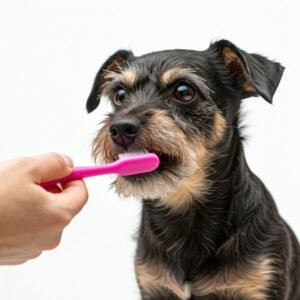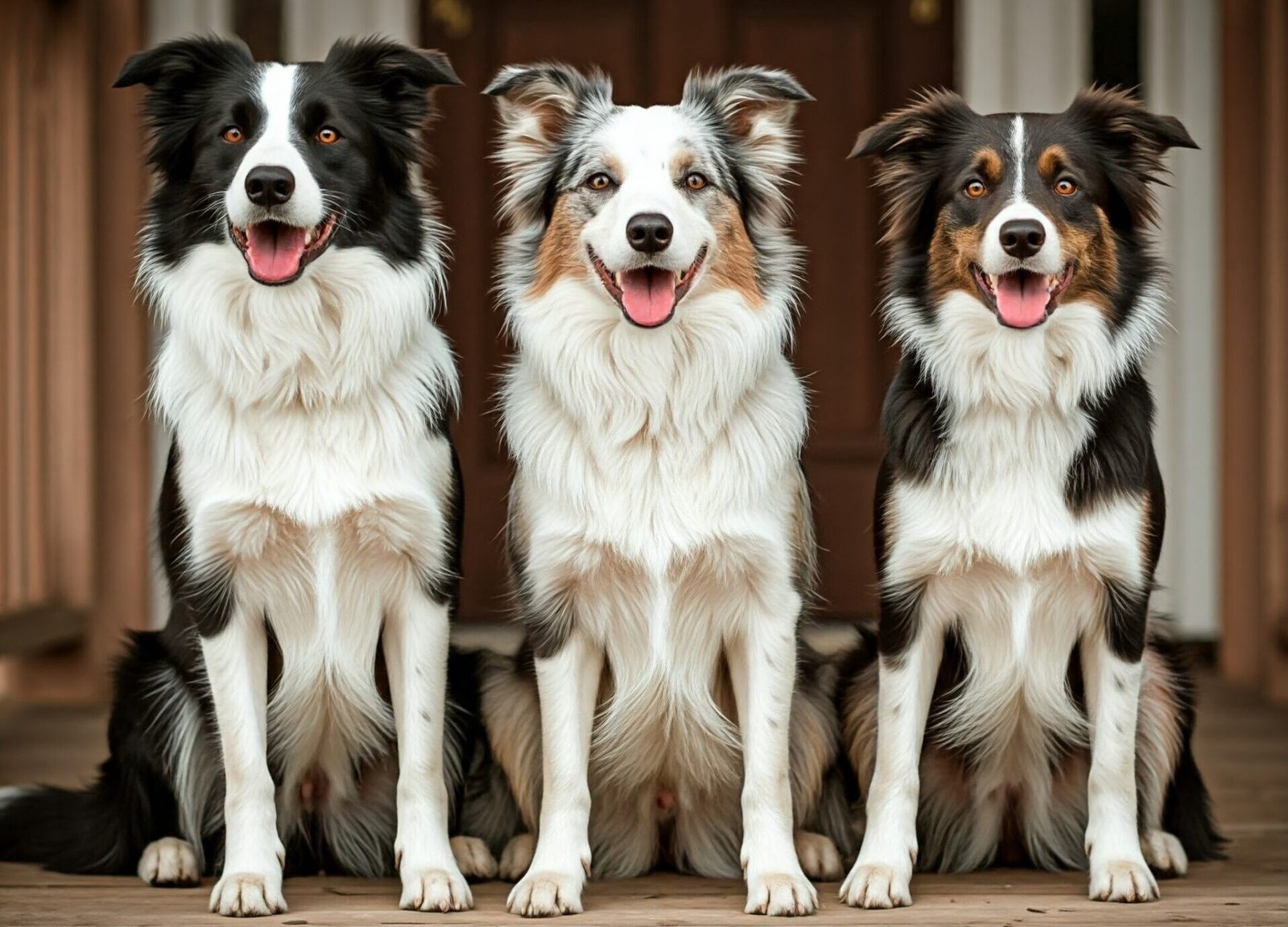How Often Should I Brush My Dog’s Teeth?
A Comprehensive Guide to Canine Dental Care
Heads Up Dog Owners, Does Your Dog Have Dog Breath?
If your dog’s breath is STINKY, don’t be ashamed, it can happen to the best of dogs!
Because of your dog’s stinky breath do you worry about its long-term dental health? Stinky dog breath can be a sign of dental health problems in your dog. Stinky dog breath should not be ignored and it can be eliminated if you brush your dog’s teeth. Regular dental care for your dog is vital for its overall health and well-being. Brushing your dog’s teeth is part of that regular dog dental care. So, are you wondering, “How often should I brush my dog’s teeth?” I have here a comprehensive guide to canine dental care that will answer that question.

“A dog is the only thing on earth that loves you more than you love yourself.” – Josh Billings
The Importance of Brushing Your Dog’s Teeth For Good Dental Hygiene:
If you want your dog to have a long and healthy life, then you ought to make brushing your dog’s teeth a regular routine. A dog with bad dental health is subject to serious bad health problems, such as plaque build up, the formation of tartar, and gum disease. Plaque occurs when food particles and bacteria accumulate on the teeth. Bad breath is a common sign of poor dog oral health. Plaque can harden into tarter if it is not removed by simply brushing your dog’s teeth. The serious gum disease gingivitis can be cause by the accumulation of plaque and tartar. Gingivitis is characterized by gum bleeding, redness, and inflammation.
Plaque, tartar, and gingivitis can cause very terrible health issues for your dog. These conditions may lead to periodontal disease.
You don’t want your loved dog to have periodontal disease. It’s a serious health condition. Periodontal disease happens when the tissue around a dog’s teeth is damaged and that can lead to tooth loss or bacteria entering into the blood stream. Bacteria your dog’s blood can have a terrible affect on your dog’s health It may take your dog’s life by damaging vital organs. Periodontal disease can cause heart disease (specifically endocarditis, which is an inflammation of the heart’s inner lining), kidney disease, or liver disease. All these diseases can be deadly to your dog. They can unnecessarily cut your dog’s life short.
That sounds awful doesn’t it? Yes, it does. No one wants their much loved dog, a member of your family, to suffer from these awful life-threatening diseases.
But there is GOOD NEWS! These dental health problems are largely preventable if you take action to stop periodontal disease in your dog by properly brushing your dog’s teeth on a regular basis.
What’s the Answer to: How Often Should I Brush My Dog’s Teeth?
Ideally, you should brush your dog’s teeth daily. This helps remove plaque and prevent tartar buildup. However, life can get busy so even brushing as often as you, even if only a few times a week, can make a significant difference in your dog’s dental health. Perhaps if you can’t brush your dog’s teeth every day then do it on day dates of even or odd calendar numbers. That’s days… not months!
How To Brush Your Dog’s Teeth To Prevent Periodontal Disease:
By brushing your dog’s teeth regularly and practicing proper dog dental care using special dog toothpaste and brushes, plus giving your dog dental chew treats, will help prevent these conditions. The chances of your dog having plaque, tartar, gingivitis, or periodontal disease can be greatly lessened if you brush its teeth. Early intervention and consistent care on your part can significantly improve your dog’s quality of life and reduce the risk of these serious dental health complications.
A good and useful dog toothbrushing kit that has a toothbrush and an enzymatic toothpaste: Nutri-vet Oral Hygiene Kit For Dogs Is A Convenient Way To Help Maintain Healthy Gums And Teeth In Dogs Of All Ages.

Some Useful Tips For Brushing Your Dog’s Teeth:
While regular brushing is crucial, there are other strategies to enhance your dog’s dental health.
- Start Early: Introduce toothbrushing to your puppy as early as possible to make it a positive experience. Older dogs certainly need toothbrushing too and can get used to it.
From TropiClean: “Oral care is about more than making your pets? smiles sparkle—it’s an important component of their overall health. In fact, 80% of dogs begin to show signs of oral disease by age 3. Our Fresh Breath Oral Care Kit includes our TripleFlex Toothbrush, Finger Brush and our Brushing Gel for Dogs. Our Brushing Gel for Dogs is infused with green tea leaf extract that naturally defends against plaque and tartar and clings to their teeth for a superior clean. Our TripleFlex Toothbrush cleans 3x faster with its easy 360-degree bristles. Also included is our Finger Brush which allows you to gently clean helping dissolve plaque and tartar. Clean teeth, healthy mouth, happy dog.”
Here is everything you need to start brushing your puppy’s teeth: TropiClean Fresh Breath Oral Care Kit for Dogs Puppy
- Use the Right Tools: Invest in a dog-specific toothbrush and toothpaste formulated for dogs. Human toothpaste can be harmful to dogs.
From Vet’s Best: ” Provide the best dental care for your dog with Vet’s Best Complete Enzymatic Dental Care Gel & Toothbrush Kit. Our veterinarian-formulated toothpaste contains enzymes and natural ingredients (including neem oil, grapefruit seed extract, baking soda, and aloe) that gently clean away plaque and tartar while freshening your dog?s breath. The kit includes our triple-headed toothbrush, which makes brushing quick and convenient. Three bristle heads are positioned to form around each tooth, efficiently cleaning from every angle simultaneously.”
A kit with the right tools for brushing your dog’s teeth: Vet’s Best Dental Care Kit with Toothbrush and Gel for Dogs Toothpaste
- Be Gentle: Start by gently massaging your dog’s gums with your finger. Gradually introduce the toothbrush.
- Be Patient: It may take some time for your dog to get used to toothbrushing. Don’t force it.
- Positive Reinforcement: Reward your dog by offering it dog dental chews and dental chew toys. Get dental chews and chew toy treats that are made designed for dogs. These types of products often contain ingredients that help scrape away plaque and tartar off of your dog’s teeth. Dogs love them!

“Dogs never bite me. I bring them treats.” – Alfred Hitchcock
- Dental Diets:
These beneficial dog diets dogs are made to retard and reduce tartar buildup and encourage good dental health. They are healthy and have good balanced nutrition. - Regular Veterinary Check-ups:
Routine professional veterinary check-ups are essential for your dog’s dental and overall health. A veterinarian can examine your pet and suggest or prescribe solutions tailored to your pet’s health. Many vets will send you notifications of when your dog is due for a visit. Regularly take your dog to a veterinarian for professional cleanings to remove tartar buildup and to address any underlying dental issues like gum disease, tooth decay, and periodontal disease. - 4. Consider Home Remedies To Freshen Your Dog’s Breath:
To help get rid of doggy breath there are water additives with ingredients to freshen your dog’s breath. These ingredients might be parsley or mint. Be aware that doggy breath (Halitosis) can be a sign that your dog has underlying dental health problems, it might be good for your dog to see a veterinarian if it has bad breath.
“Dogs don’t care if you’re rich or poor, smart or dumb, handsome or ugly. They love you unconditionally, for who you are.” – Bob Barker
Conclusion Of How Often Should I Brush My Dog’s Teeth?
With regular brushing of your dog’s teeth, giving your dog dental chews and dental chew toys, veterinary check-ups, and other preventive measures, you can greatly improve your dog’s dental health and overall happiness and health. A dog with good dental health will be a happy dog!

From Victor: “Formulated with large breeds in mind, this nutrient-dense, multi-protein formula provides natural sources of glucosamine and chondroitin to help support healthy hip and joint development and joint care for all life stages. Designed with a higher protein, lower fat ratio and proper calcium levels, Elite Canine is appropriate for large breed puppies and adult dogs. With scientifically advanced and nutritionally complete ingredients, this formula promotes sustained energy and healthy immune and digestive systems.”
A great healthy food for your dog: Victor Super Premium Dog Food Classic Elite Canine Large Breed Dry Dog Food Chicken & Rice
“Dogs are not our whole life, but they make our lives whole.” – Roger Caras
